
August 2017
Semitic Semiotics or Semiotic Semitics
I begin this presentation with a brief explanation of the pun in its title. The adjective “Semitic” ultimately derives from the name Shem (Hebrew šēm). The Hebrew term for “name,” šēm, is identical. In Genesis 9:26, Noah invokes the blessing of Yahweh by the name-title “Yahweh, God of Shem,” which one might also render “Yahweh, God of Name” or “Yahweh, God of Renown.”[1] Within the context of Genesis and biblical Hebrew narrative as a whole, where names dominate as symbols and signals within biblical narrative, “God of Shem” or “God of Name” constitutes an appropriate divine title.
As an English adjective, Semitic refers to a family of languages and cultures of which the Hebrew language and ancient Israelite culture constituted a branch. The term Semiotics derives from the similar-sounding Greek word sēmeion, a “sign.” Semiotics is the study of how meaning is made and conveyed—or signified—in language, literature, and so forth.
b
Names, as signals or signs, communicated much more in terms of meaning anciently than they often do today. As Michael P. O’Connor has noted, “Semitic names are often linguistically transparent, i.e., meaningful as ordinary words (or compounds of them) in the language of their hearers.” [2] In other words, names in the ancient Israelite onomasticon most often meant something to ancient Israelites in the Hebrew language or in languages of neighboring cultures with which at least some members of their society (e.g., scribes) were familiar (e.g., Egyptian, cf. Egyptian names Phinehas, Hophni, Pashhur, Miriam/Mary, etc.). With the exception of a few linguistically transparent[3] personal names like Rose, Lily (and other “flower names”), Sunny, Hope, and so forth, English names overwhelmingly tend to be linguistically opaque.
In this paper I wish to demonstrate that one important aspect of understanding the content and function of scriptural narrative is recognizing contact points between names and their etymological or etiological meanings within individual biographies and narratives. This is indisputably true of Biblical Hebrew narrative, but I also wish to present some examples of where it appears to be true of Book of Mormon biography and narrative and of certain inspired textual restorations belonging to the Joseph Smith Translation of Genesis.
A Methodological Note
In this paper I will not attempt to describe or account for a pre-Israelite origin for the Genesis names and stories discussed herein. I wish us, rather, to attempt to understand these stories and names as would an ancient Israelite audience—the original literary and implied audience of the Hebrew Bible. Moreover, in discussing these names in a narrative (and Book of Mormon narrative) context, I assume that the Book of Mormon constitutes a work of translation literature (as it claims), rather than 19th century frontier fiction as some summarily dismiss it. I also proceed from the standpoint that the writers of the Book of Mormon knew and used the languages that they said they knew and used (see Moroni 9:32-33)—i.e., Hebrew and Egyptian—and that names in their onomasticon and their perceived meanings were linguistically transparent and literarily useful within the bounds of the Israelite scriptural tradition of which these authors constitute a part.
Adam of the Ground and Eve the Life-giver
The first mention of humanity in Genesis, emphasizes the collective creation of human beings—Hebrew hāʾādām—in the divine “image” (dĕmût, Genesis 1:27). The narrative emphasizes the same point in Genesis 5:2: “Male and female created he them; and blessed them, and called their name Adam [ʾādām, humanity] in the day when they were created.”
 The intervening creation/fall narrative (Genesis 2:3–3:24), however, emphasizes the connection between Adam (humanity) and the ground and between Eve (ḥawwâ, “life-giver”) and “life.” At first, there was “not a man [ʾādām] to till the ground [hāʾădāmâ]” (Genesis 2:5) “But there went up a mist [or stream] from the earth, and watered the whole face of the ground [hāʾădāmâ]” (Genesis 2:6). Then, the narrator states, “the Lord God [Yahweh Elohim] formed man [hāʾādām] of the dust of the ground [hāʾădāmâ], and breathed into his nostrils the breath of life [nišmat ḥayyîm]; and man [hāʾādām] became a living soul [nepeš ḥayyâ]” (Genesis 2:7; see also Moses 3:7, 9). Even in the creation of Adam from the ʾădāmâ, the narrative already hints at the name Eve (ḥawwâ) in the repeated root ḥwy/ḥyy—“living,” “life”
The intervening creation/fall narrative (Genesis 2:3–3:24), however, emphasizes the connection between Adam (humanity) and the ground and between Eve (ḥawwâ, “life-giver”) and “life.” At first, there was “not a man [ʾādām] to till the ground [hāʾădāmâ]” (Genesis 2:5) “But there went up a mist [or stream] from the earth, and watered the whole face of the ground [hāʾădāmâ]” (Genesis 2:6). Then, the narrator states, “the Lord God [Yahweh Elohim] formed man [hāʾādām] of the dust of the ground [hāʾădāmâ], and breathed into his nostrils the breath of life [nišmat ḥayyîm]; and man [hāʾādām] became a living soul [nepeš ḥayyâ]” (Genesis 2:7; see also Moses 3:7, 9). Even in the creation of Adam from the ʾădāmâ, the narrative already hints at the name Eve (ḥawwâ) in the repeated root ḥwy/ḥyy—“living,” “life”

After the woman, still heretofore unnamed within the narrative, gives her husband some of the fruit of the tree of knowledge of good and evil, Yahweh Elohim declares the consequences of the transgression. First comes the decreed punishment for the serpent who initially tempted the woman: “Because thou hast done this, thou art cursed above all cattle, and above every beast [ḥayyat, literally, living creature] of the field; upon thy belly shalt thou go, and dust [ʿāpār] shalt thou eat all the days of thy life [ḥayyêkā]” The serpent who had been “more subtle [ʿārûm, more naked, cf. Adam and Eve as ʿărûmmîm, Genesis 2:25] than any ḥayyat [living creature]” would now be more cursed, eating the ground whence Adam was taken. In in a similar vein, the decreed consequences for Adam play on the name Adam and anticipate the name Eve:

Genesis 3:17; 4:11-12; 5:29; 7:23; 8:21
And unto Adam [ʾādām] he said, Because thou hast hearkened unto the voice of thy wife, and hast eaten of the tree, of which I commanded thee, saying, Thou shalt not eat of it: cursed is the ground [hāʾădāmâ] for thy sake; in sorrow shalt thou eat of it all the days of thy life [ḥayyêkā]. Thorns also and thistles shall it bring forth to thee; and thou shalt eat the herb of the field; In the sweat of thy face shalt thou eat bread, till thou return unto the ground [hāʾădāmâ]; for out of it wast thou taken: for dust [ʿāpār] thou art, and unto dust [ʿāpār] shalt thou return” (Genesis 3:18-19).
The cursing of “the ground” (hāʾădāmâ) becomes a running theme in the primeval history (see Genesis 3:17; 4:11-12; 5:29; 7:23; 8:21).
 This second instance of the phrase “all the days of thy life” (kōl yĕmê ḥayyêkā) particularly anticipates the giving of the name Eve (ḥawwâ), “life-giver” and the appositional phrase, “mother of all living.” Though Adam will eat “in sorrow,” Adam’s “life” cannot merely amount to sorrow. In the context of all the foregoing, the narrative finally proffers the name that until this point it has proleptically withheld: “And Adam called his wife’s name Eve [ḥawwâ], because she was the mother of all living [ʾēm kol ḥay]” (Genesis 3:2). JST Genesis adds “for thus have I, the Lord God, called the first of all women, which are many” (Moses 4:26). The phrase “mother of all living” (ʾēm kol ḥay) offers an explanation for the form ḥawwâ, which firmly ties Eve and her name to forms of ḥwy/ḥyy (“life”; “live,” “living”) reiterated throughout the narrative.
This second instance of the phrase “all the days of thy life” (kōl yĕmê ḥayyêkā) particularly anticipates the giving of the name Eve (ḥawwâ), “life-giver” and the appositional phrase, “mother of all living.” Though Adam will eat “in sorrow,” Adam’s “life” cannot merely amount to sorrow. In the context of all the foregoing, the narrative finally proffers the name that until this point it has proleptically withheld: “And Adam called his wife’s name Eve [ḥawwâ], because she was the mother of all living [ʾēm kol ḥay]” (Genesis 3:2). JST Genesis adds “for thus have I, the Lord God, called the first of all women, which are many” (Moses 4:26). The phrase “mother of all living” (ʾēm kol ḥay) offers an explanation for the form ḥawwâ, which firmly ties Eve and her name to forms of ḥwy/ḥyy (“life”; “live,” “living”) reiterated throughout the narrative.
The creation/fall narrative concludes with additional wordplay on Adam in terms of ʾădāmâ (“ground”) and on Eve in terms of “life” and “living:
| Genesis 3:21-24 | Moses 4:26-31 |
| Unto Adam [ʾādām] also and to his wife did the Lord God make coats of skins, and clothed them. And the Lord God said, Behold, the man [hāʾādām] is become as one of us, to know good and evil: and now, lest he put forth his hand, and take also of the tree of life [ʿēṣ haḥayyîm], and eat, and live for ever [ḥay lĕʿōlām]: Therefore the Lord God sent him forth from the garden of Eden, to till the ground [hāʾădāmâ] from whence he was taken. So he drove out the man [hāʾādām]; and he placed at the east of the garden of Eden Cherubims, and a flaming sword which turned every way, to keep the way of the tree of life [ʿēṣ haḥayyîm]. | Unto Adam, and also unto his wife, did I, the Lord God, make coats of skins and clothed them. And I, the Lord God, said unto mine Only Begotten: Behold, the man [hāʾādām] is become as one of us to know good and evil; and now lest he put forth his hand and partake and partake also of the tree of life [ʿēṣ haḥayyîm], and eat and live forever [ḥay lĕʿōlām], Therefore I, the Lord God, will send him forth from the Garden of Eden, to till the ground [hāʾădāmâ] from whence he was taken; For as I, the Lord God, liveth [ḥay], even so my words cannot return void, for as they go forth out of my mouth they must be fulfilled. So I drove out the man [hāʾādām], and I placed at the east of the Garden of Eden, cherubim and a flaming sword, which turned every way to keep the way of the tree of life [ʿēṣ haḥayyîm]. |
In the JST Genesis/Book of Moses account, Yahweh Elohim adds weight to the decreed consequence, “thou shalt surely die,” with the presence of the ancient oath formula: the Lord swears by his own “life” (“For even as I, the Lord God, liveth [ḥay]”). God’s life is, of course, the very definition of “eternal life.”
Moses 5 records that after expulsion from the Garden, “Adam began to till the earth [i.e., hāʾădāmâ] … And Eve, also, his wife, did labor with him” (Moses 5:1). Their children too “began to divide two and two in the land and to till the land [i.e., hāʾădāmâ]” (Moses 5:2). This more extensive narrative also records:
And in that day Adam blessed God and was filled, and began to prophesy concerning all the families of the earth [mišpĕḥôt hāʾădāmâ, Genesis 12:3; 28:14],[4] saying: Blessed be the name of God, for because of my transgression my eyes are opened, and in this life [Heb. ḥayyîm][5] I shall have joy, and again in the flesh I shall see God. And Eve [ḥawwâ], his wife, heard all these things and was glad, saying: Were it not for our transgression we never should have had seed, and never should have known good and evil, and the joy of our redemption, and the eternal life [cf. “live forever,” ḥay lĕʿōlām ; Genesis 3:22] which God giveth unto all the obedient. (Moses 5:10-11)
In this text restoration, the phrase “families of the earth,” a collocation which elsewhere in Genesis (see Genesis 12:3; 28:14) takes the Hebrew form mišpĕḥôt hāʾădāmâ, directly plays on the name Adam (“humanity”). Thus, Adam who was “taken from the ground” will become father or patriarch of all of the families or clans that will live thereon. Because of his wife Eve and her power to give “life,” however, Adam’s “life” will not merely consist of eating bread “in sorrow.”
Eve’s words, moreover, directly play on the idea of “life-giving” and expand it to include not only mortal life, but “eternal life”—the “living forever” mentioned in Genesis 3:22 in its truest sense. The name Adam thus becomes a symbol of fatherhood/patriarchy over “all the families of the earth” while Eve’s name becomes a symbol of both her motherhood and matriarchy over humanity’s mortal life, but also humanity’s “eternal life.” In other words, Eve, in a true sense, opened the way for mortal life and thus becomes matriarch or “life-giver” of “eternal life.” Eve (LXX Zoē = “life”) and her name thus constitute a type of Jesus Christ whom Paul calls not just a Second Adam, but a “life-making spirit” (pneuma zōopoioun, 1 Corinthians 15:45).[6]
The JST Genesis/Book of Moses account thus attests an even wider narratological view of the names “Adam” and “Eve” in terms of the “ground”/“earth” and “life” than does the canonical Genesis text in its present form. In the restored narrative, the name Adam becomes an emotive symbol of more than just “ground” and “dust” whither the mortal body is destined to return, but a symbol of fatherhood over all the families on the earth or ground. Similarly, the name Eve becomes more than a symbol of motherhood and mortal life-giving, but also of eternal matriarchy and the mother of eternal lives.[7]
Cain and Getting Gain
Following the account of the Creation and the Fall, the Genesis narrative describes how the consequences of the Fall play out in the lives of Adam and Eve’s posterity. The first child that the Genesis narrative names is Cain, for whose name it offers an etiological explanation (a story of origin)[8] in terms of the Semitic/Hebrew verb qny/qnh (“get,” “acquire,” “create”):
| Genesis 4:1 | Moses 5:16 |
| And Adam knew Eve his wife; and she conceived, and bare Cain [qayin], and said, I have gotten [qānîtî] a man from the Lord. | And Adam and Eve, his wife, ceased not to call upon God. And Adam knew Eve his wife, and she conceived and bare Cain [qayin], and said: I have gotten [qānîtî] a man from the Lord; wherefore he may not reject his words. But behold, Cain hearkened not, saying: Who is the Lord that I should know him? |
The initial etiology is positive: Eve “got,” “acquired,” or “(pro)-created” Cain with Yahweh’s help. We should note here that JST Genesis preserves the detail that Satan had quickly led Adam and Eve’s older posterity astray (Moses 5:13, cf. 5:18, 23). Hence, JST’s longer explanation of the name Cain in terms of qny/qnh clearly expresses the parental expectation that because Cain was “gotten” or “gained” from Yahweh through continuous special petitioning (“Adam and Eve, his wife, ceased not to call upon God”), he would be of such spiritual make as to not reject the Lord like his older siblings, “wherefore he may not reject his words” (Moses 5:16). Nevertheless, even though “Cain” was “gotten” or “acquired” from the Lord, yet he “rejected” him and his words, even after the latter “revealed himself” to Cain (Moses 6:3).
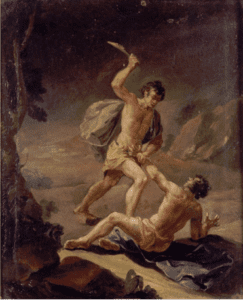 Then the JST Genesis (or Book of Moses) narrative preserves a part of the etiology that the present-day biblical account does not. The name Cain itself becomes a part of the explanation of the origin of secret combinations. The narrative ties the name “Cain” to “getting” or “acquiring” in a much more sinister way. Having been warned against defecting unto perdition (“thou shalt be called Perdition”)[9]—total “loss” or “ruin,” an antonym of “gain”—Cain conspires with Satan and murders Abel: “And Cain said: Truly I am Mahan, the master of this great secret, that I may murder and get gain. Wherefore Cain was called Master Mahan, and he gloried in his wickedness” (Moses 5:31). Here, in chilling fashion, Cain inverts the positive symbol of his name (“gotten,” “acquired”) into a distinctly negative symbol: a symbol of secret combinations and murder for gain—i.e., organized evil with the modus operandi of murder for profit.
Then the JST Genesis (or Book of Moses) narrative preserves a part of the etiology that the present-day biblical account does not. The name Cain itself becomes a part of the explanation of the origin of secret combinations. The narrative ties the name “Cain” to “getting” or “acquiring” in a much more sinister way. Having been warned against defecting unto perdition (“thou shalt be called Perdition”)[9]—total “loss” or “ruin,” an antonym of “gain”—Cain conspires with Satan and murders Abel: “And Cain said: Truly I am Mahan, the master of this great secret, that I may murder and get gain. Wherefore Cain was called Master Mahan, and he gloried in his wickedness” (Moses 5:31). Here, in chilling fashion, Cain inverts the positive symbol of his name (“gotten,” “acquired”) into a distinctly negative symbol: a symbol of secret combinations and murder for gain—i.e., organized evil with the modus operandi of murder for profit.
The “gain” that Cain has in view, of course, is his Abel’s “flocks” (Moses 5:33, 38). Hugh Nibley has observed that “all the oldest words for money simply mean flocks; our words ‘fee’ and ‘pecuniary’ mean flocks.”[10] One of the most important Hebrew terms for “cattle,” miqneh, derives from *qny/qnh, “to get, acquire,” the same verbal root under discussion here.
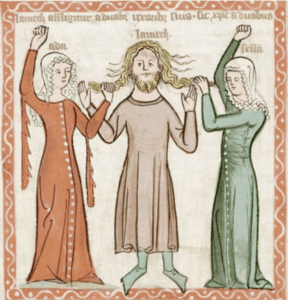 The narrative repeats the Cain/“gain” wordplay near the end of the pericope as Cain’s oath-bound secret combination perpetuates in subsequent generations: “For Lamech having entered into a covenant with Satan, after the manner of Cain, wherein he became Master Mahan, master of that great secret which was administered unto Cain by Satan; and Irad, the son of Enoch, having known their secret, began to reveal it unto the sons of Adam; Wherefore Lamech, being angry, slew him, not like unto Cain, his brother Abel, for the sake of getting gain, but he slew him for the oath’s sake” (Moses 5:49-50).
The narrative repeats the Cain/“gain” wordplay near the end of the pericope as Cain’s oath-bound secret combination perpetuates in subsequent generations: “For Lamech having entered into a covenant with Satan, after the manner of Cain, wherein he became Master Mahan, master of that great secret which was administered unto Cain by Satan; and Irad, the son of Enoch, having known their secret, began to reveal it unto the sons of Adam; Wherefore Lamech, being angry, slew him, not like unto Cain, his brother Abel, for the sake of getting gain, but he slew him for the oath’s sake” (Moses 5:49-50).
As Noel B. Reynolds has observed, the writers and compilers of the Book of Mormon had access to fuller versions of the Genesis narratives on the plates of brass.[11] Mormon and Moroni’s incorporation of wordplay on the name Cain in terms of Semitic qny/qnh, just as we find in JST Genesis, dramatically supports that thesis. In Helaman 6, Mormon describes how “secret combinations” began to overspread Nephite society. He ties these secret combinations to Cain and his initial plot with Satan via wordplay very similar to what we witness in Moses 5:31, 50: “they [the Nephites] began to seek to get gain that they might be lifted up one above another; therefore they began to commit secret murders, and to rob and to plunder, that they might get gain. (Helaman 6:17). Who was the source of their secret crimes? “Yea, that same being who did plot with Cain, that if he would murder his brother Abel it should not be known unto the world. And he did plot with Cain and his followers from that time forth” (Helaman 6:27).
One of Mormon’s stated literary aims was to show that “at the end of this book”—i.e., the “book of Nephi” from which he took his abridged account—that Cainitic secret combinations “did prove the overthrow, yea, almost the entire destruction of the people of Nephi” (Helaman 2:13-14). Mormon’s personal account of his own life and times includes these secret combinations as a major contributing factor in his people’s downfall (see Mormon 1:18; 2:8, 10, 27-28; cf. 8:9). Moroni, having seen the final destruction of his people and left to finish his father’s work, records that Cainitic secret combinations destroyed the Jaredites. Mormon had intended to tell this story as we learn in Mosiah 28:17.[12] In his abridged Book of Ether, Moroni writes:
And it came to pass that thus they did agree with Akish. And Akish did administer unto them the oaths which were given by them of old who also sought power, which had been handed down even from Cain, who was a murderer from the beginning. And they were kept up by the power of the devil to administer these oaths unto the people, to keep them in darkness, to help such as sought power to gain power, and to murder, and to plunder, and to lie, and to commit all manner of wickedness and whoredoms. (Ether 8:15-16)
The prophetic power of Cain’s name as a symbol of “getting” unrighteous “gain” further emerges in subsequent verses as Moroni draws out the implications of the Jaredite secret combinations for his latter-day Gentile audience (Moroni uses the “gentile” Jaredites as a prototype for the gentiles of the latter-day who would inherit the promised land):
And they [i.e., secret combinations] have caused the destruction of this people of whom I am now speaking [i.e., the Jaredites], and also the destruction of the people of Nephi. And whatsoever nation shall uphold such secret combinations, to get power and gain, until they shall spread over the nation, behold, they shall be destroyed; for the Lord will not suffer that the blood of his saints, which shall be shed by them, shall always cry unto him from the ground for vengeance upon them and yet he avenge them not. Wherefore, O ye Gentiles, it is wisdom in God that these things should be shown unto you, that thereby ye may repent of your sins, and suffer not that these murderous combinations shall get above you, which are built up to get power and gain—and the work, yea, even the work of destruction come upon you, yea, even the sword of the justice of the Eternal God shall fall upon you, to your overthrow and destruction if ye shall suffer these things to be. (Ether 8:21-23)
For Mormon and Moroni, the destruction of the Nephites and the Jaredites constituted two prophetic witnesses—an Israelite witness and a Gentile witness—that secret combinations to “get gain” will overspread and destroy any nation that upholds them. And for them, the symbol of that threat was the name of the first human to plot murder with Satan to “get gain”: “Cain.” Thus the name Cain remains relevant as a prophetic witness and a warning to Israelites and Gentiles alike against passively permitting or actively engaging in murder for gain.
Noah: Rest and Comfort (Good and Bad) and Sore Repentance
The name “Noah” connoted “[divine] rest” to the ancient Israelite ear. Throughout the biblical flood narrative, Noah interplays with forms of the root *nwḥ and the unrelated, but somewhat homonymous root *nḥm (to “comfort,” “console,” “be sorry,” “regret”). The Genesis narrative explains that the patriarch Lamech named his son Noah (nōaḥ, “[divine] rest”) as follows, “And he called his name Noah [nōaḥ], saying, “This [son] shall comfort us [yĕnaḥămēnû] concerning our work and toil of our hands, because of the ground [hāʾădāmâ] which the Lord hath cursed” (Genesis 5:29; Moses 8:9). Although Lamech’s statement etiologizes Noah in terms of the somewhat homonymous *nḥm (“comfort”)-element, it expresses the notion of “rest” through antonyms: “work” (maʿăśeh) and “toil” (ʿiṣṣābôn, or “sorrow”).[13]
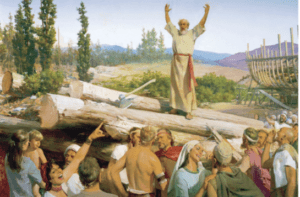 In the biblical narrative, the wordplay moves from “comfort” into a direct interplay of the roots *nḥm and *nwḥ: the Lord’s “regretting” (wayyinnāḥem, niḥamtî) over having created humanity (Genesis 6:6-7), the ark eventually coming to “rest” (wattānaḥ, Genesis 8:4), and the dove’s attempt to find “rest” (mānôaḥ, Genesis 8:9), and the “sweet savour” (rēaḥ hannîḥōaḥ) of the sacrifice that appeased Yahweh after the flood (Genesis 8:21).
In the biblical narrative, the wordplay moves from “comfort” into a direct interplay of the roots *nḥm and *nwḥ: the Lord’s “regretting” (wayyinnāḥem, niḥamtî) over having created humanity (Genesis 6:6-7), the ark eventually coming to “rest” (wattānaḥ, Genesis 8:4), and the dove’s attempt to find “rest” (mānôaḥ, Genesis 8:9), and the “sweet savour” (rēaḥ hannîḥōaḥ) of the sacrifice that appeased Yahweh after the flood (Genesis 8:21).
As I have also noted elsewhere, one of the most interesting restorative aspects of JST Genesis (the Book of Moses) is its drastic expansion of the flood narrative, which begins in the vision of Enoch (Moses 7). The wordplay begins with a fore-echo of the Noah/nḥm etiology from Genesis 5:29 (Moses 8:9) and the phrase “This [son] shall comfort us”:
And Enoch also saw Noah, and his family; that the posterity of all the sons of Noah should be saved with a temporal salvation; Wherefore Enoch saw that Noah built an ark; and that the Lord smiled upon it, and held it in his own hand; but upon the residue of the wicked the floods came and swallowed them up. And as Enoch saw this, he had bitterness of soul, and wept over his brethren, and said unto the heavens: I will refuse to be comforted; but the Lord said unto Enoch: Lift up your heart, and be glad; and look. And it came to pass that Enoch looked; and from Noah, he beheld all the families of the earth [cf. Moses 5:10]; and he cried unto the Lord, saying: When shall the day of the Lord come? When shall the blood of the Righteous be shed, that all they that mourn [e.g., Adam and Eve in Moses 5:27] may be sanctified and have eternal life? [cf. Moses 5:11] (Moses 7:42-45)
Enoch’s declaration, “I will refuse to be comforted” (Heb. “to be comforted” = lĕhitnaḥēm or hinnāḥēm)[14] in the immediate narrative context plays on the name Noah and anticipates Noah’s role in “comforting” his ancestors. But it also speaks to the Lord’s immediate efforts to console Enoch concerning those who would die in the flood; namely, the Lord’s showing him the arc of history. The Lord’s strategy to comfort Enoch not only involved showing him Noah (“rest”), but Noah’s posterity, including the Messiah. The Messiah would come though Noah’s and thus Enoch’s line (“And the Lord said: Blessed is he through whose seed Messiah shall come,” Moses 7:53). Notably, too, Enoch’s words allude back to Moses 5:10-11 and Adam’s prophecy regarding “all the families of the earth” and Eve’s words about “eternal life,” as well as Adam and Eve’s “mourning” over their posterity (Moses 5:27).
As Enoch sees Noah and his posterity, including the Messiah, the when of the earth’s “rest” becomes an all-consuming question. Terry Szink has pointed out that the term “rest” functions as wordplay on the name Noah throughout Moses 7,[15] and I have attempted to show how the wordplay is even more extensive (see also above).[16] Enoch first hears the earth—the ʾădāmâ whence Adam was taken—ask regarding her “rest”:
And it came to pass that Enoch looked upon the earth and he heard a voice from the bowels thereof, saying: Wo, wo is me, the mother of men; I am pained, I am weary, because of the wickedness of my children. When shall I rest, and be cleansed from the filthiness which is gone forth out of me? When will my Creator sanctify me, that I may rest, and righteousness for a season abide upon my face? (Moses 7:48)
The Lord’s promise that the Messiah would come through Noah’s (and thus his own) posterity (Moses 7:53) is not enough to comfort Enoch, and the earth’s question becomes his own: “And it came to pass that Enoch cried unto the Lord, saying: When the Son of Man cometh in the flesh, shall the earth rest? I pray thee, show me these things” (Moses 7:54). Enoch then sees the Messiah—the Son of Man—crucified (Moses 7:55). He again hears a voice, sees the heavens veiled, and hears the earth groan (Heb. *ʾnḥ). Enoch then witnesses the resurrected righteous come forth and stand at the right-hand of God, while the wicked remained in spirit prison. Still, this does not comfort Enoch: “And again Enoch wept and cried unto the Lord, saying: When shall the earth rest?” (Moses 7:58). Enoch then receives promises from the Lord concerning his eventual Second Coming and a promise of the earth’s “rest”: “And the day shall come that the earth shall rest, but before that day the heavens shall be darkened, and a veil of darkness shall cover the earth; and the heavens shall shake, and also the earth; and great tribulations shall be among the children of men, but my people will I preserve” (Moses 7:61). The Lord also promises Enoch that his Zion will come again and then the earth shall rest: “And there shall be mine abode, and it shall be Zion, which shall come forth out of all the creations which I have made; and for the space of a thousand years the earth shall rest” (Moses 7:64).
While the fuller restored Enoch-Noah-Flood narrative makes the name Noah symbol of the divine “comfort” of Enoch and the patriarchs and prophetic symbol of the earth’s eventual “rest,” Mormon’s narrative history of the people of Zeniff describes King Noah and his priests as the moral obverse of the biblical Noah, but also playing on that name in terms of *nwḥ and *nḥm. In Mormon’s (and his source’s) account of king Noah’s reign—king “Rest”—causes the people to “labor exceedingly to support iniquity” (Mosiah 11:6) and “his workmen [to] work all manner of work” within the walls of his palace-temple (Mosiah 11:10). Meanwhile, his court-priests laze about on an ornate breastwork built so “that they might rest [*wayyannîḥû] their bodies and their arms upon [it] while they should speak lying and vain words to [the] people” (Mosiah 11:11). That neither Noah nor his priests understood what should have been their role in achieving Isaiah’s prophetic promise, “the Lord hath comforted [niḥam] his people” (Isaiah 52:9) is evidenced by Noah’s priest’s quotation of that scripture (Isaiah 52:7-10) in Mosiah 12:20-23 in an attempt to entrap Abinadi. King Noah’s method of administering comfort to his people came through his large-scale wine-making (Mosiah 11:15), which also inverts the Genesis image of Noah’s wine-making (see Genesis 9).
Later, Alma plays on the name Noah when he states his reasons for foregoing kingship, “But remember the iniquity of king Noah and his priests; and I myself was caught in a snare, and did many things which were abominable in the sight of the Lord, which caused me sore repentance” (Mosiah 23:9). King Mosiah II, using Alma’s own thoughts, argues for the Nephite abandonment of monarchy: “Yea, remember king Noah, his wickedness and his abominations, and also the wickedness and abominations of his people. Behold what great destruction did come upon them; and also because of their iniquities they were brought into bondage. And were it not for the interposition of their all-wise Creator, and this because of their sincere repentance, they must unavoidably remain in bondage until now” (Mosiah 29:18-19).
 I deem it no incidental narrative detail that Alma founded his church on different kind of “comfort” than that offered by king Noah and his priests. The baptismal covenant of Alma’s church required being “willing to mourn with those that mourn; yea, and comfort those that stand in need of comfort, and to stand as witnesses of God at all times and in all things” (Mosiah 18:9). Not long after making this covenant, Alma’s people were brought into bondage according to Abinadi’s prophecy regarding Noah’s then-unrepentant people. Alma’s people would become the witnesses they had covenanted to be by the Lord’s “comforting” them his way (Isaiah 52) rather than King Noah’s:
I deem it no incidental narrative detail that Alma founded his church on different kind of “comfort” than that offered by king Noah and his priests. The baptismal covenant of Alma’s church required being “willing to mourn with those that mourn; yea, and comfort those that stand in need of comfort, and to stand as witnesses of God at all times and in all things” (Mosiah 18:9). Not long after making this covenant, Alma’s people were brought into bondage according to Abinadi’s prophecy regarding Noah’s then-unrepentant people. Alma’s people would become the witnesses they had covenanted to be by the Lord’s “comforting” them his way (Isaiah 52) rather than King Noah’s:
And it came to pass that the voice of the Lord came to them in their afflictions, saying: Lift up your heads and be of good comfort, for I know of the covenant which ye have made unto me; and I will covenant with my people and deliver them out of bondage. And I will also ease the burdens which are put upon your shoulders, that even you cannot feel them upon your backs, even while you are in bondage; and this will I do that ye may stand witnesses for me hereafter, and that ye may know of a surety that I, the Lord God, do visit my people in their afflictions. (Mosiah 24:13-14)
As Alma’s people prove true and faithful to their covenant obligations, the Lord fulfills his: “And it came to pass that so great was their faith and their patience that the voice of the Lord came unto them again, saying: Be of good comfort, for on the morrow I will deliver you out of bondage.” For the Nephites, the name Noah became a symbol not only of negative “rest” and “comfort,” but the contrastive “rest” and “comfort” that the Lord offers his people.[17]
Jacob and Enos: Wrestling God and Man
Following the Primeval History, the ensuing patriarchal narratives in Genesis make the names Abraham, Isaac, Ishmael, and Jacob symbolic focal points. Abram, “father is exalted” or “exalted father” becomes Abraham, “Father of a multitude” even an ʾab hămôn goyim, “a father of many nations” (Genesis 17:3-4). His son Isaac’s name, “may he laugh,” becomes a symbol of “rejoicing” in one’s posterity, particularly in the JST version. Wordplay on the name Ishmael (“May he [God] hear”) intertwines with wordplay on Isaac in the narratives that deal with them. The name Ishmael becomes a symbol of God’s willingness to “hear” and of “obedience.”[18]
The Semitic name Jacob (Heb. yaʿăqōb) means “May he [the god] protect” or “He [the god] will protect” the one so named.[19]Of inestimable importance to ancient Israelites, the name Jacob receives different narratalogical treatments—negative and positive—in the Genesis narratives. At the birth of Esau and Jacob, the narrator states, “And after that came his brother [Jacob] out, and his hand took hold on Esau’s heel [ʿăqēb]; and his name was called Jacob [yaʿăqōb]” (Genesis 25:26). This explanation hints at future conflict between the brothers.
Later, as both brothers grow to maturity, Jacob obtains Esau’s birthright and then his birthright blessing by subterfuge. Isaac explains to Esau, “thy brother came with subtilty [mirmâ]” (Genesis 27:35). An irate Esau then declares: “And he said, Is not he rightly named Jacob [yaʿăqōb]? for he hath supplanted me [wayyaʿqĕbēnî] these two times: he took away my birthright; and, behold, now he hath taken away my blessing” (Genesis 27:36). The prophet Jeremiah, a contemporary of Lehi, used this the name Jacob as a pejorative (negative) symbol when he criticized the inhabitants of Judah: “Take ye heed every one of his neighbour, and trust ye not in any brother: for every brother will utterly supplant [ʿāqôb yaʿqōb]” (Jeremiah 9:4). Malachi’s prophecies further allude to it, using the verb qbʿ: “I am the Lord, I change not; therefore ye sons of Jacob [yaʿăqōb] are not consumed. … Will a man rob [hăyiqbaʿ] God? Yet ye have robbed [qōbĕʿîm] me. But ye say, Wherein have we robbed thee [qĕbaʿănûkā]? In tithes and offerings. Ye are cursed with a curse: for ye have robbed [qōbĕʿîm] me, even this whole nation. (Malachi 3:6, 8-9; 3 Nephi 24:6, 8-9). In the Book of Mormon, the traditional Lamanite charge that Nephi and the Nephites had “robbed” Laman and the Lamanites (e.g., Mosiah 10:16-17; Alma 20:13; 54:17) might have some reference to the name Jacob as a pejorative symbol of “robbing,” “supplanting” or “usurping.”[20]
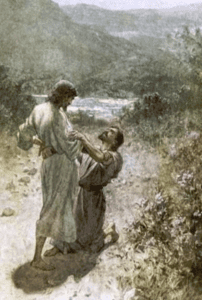 But the subsequent Genesis narrative somewhat reverses its pejorative treatment of the name Jacob. In Genesis 32–33, the patriarch Jacob crosses the Jabbok and undergoes a transformation at “Peniel” (“face of El [God]”) where the narrator states, “and there wrestled [wayyēʾābēq] a man [ʾîš] with him … and the hollow of Jacob’s thigh was out of joint, as he wrestled [bĕhēʾābĕqô] with him” Jacob receives the new name Israel from the “man” because “as a prince hast thou power [śārîtā; or, thou hast struggled] with God[s] [ʾĕlōhîm] and with men [ʾănāšîm], and hast prevailed” (Genesis 32:28). Following his transformation, the narrator makes Jacob’s name a symbol of joyful reconciliation and at-one-ment as his estranged brother Esau embraces him: “And Esau ran to meet him, and embraced him [wayḥabbĕqēhû], and fell on his neck, and kissed him: and they wept” (Genesis 33:4). Jacob afterward exclaims, “I have seen thy face, as though I had seen the face of God [cf. Peniel], and thou wast pleased with me” (Genesis 33:10).
But the subsequent Genesis narrative somewhat reverses its pejorative treatment of the name Jacob. In Genesis 32–33, the patriarch Jacob crosses the Jabbok and undergoes a transformation at “Peniel” (“face of El [God]”) where the narrator states, “and there wrestled [wayyēʾābēq] a man [ʾîš] with him … and the hollow of Jacob’s thigh was out of joint, as he wrestled [bĕhēʾābĕqô] with him” Jacob receives the new name Israel from the “man” because “as a prince hast thou power [śārîtā; or, thou hast struggled] with God[s] [ʾĕlōhîm] and with men [ʾănāšîm], and hast prevailed” (Genesis 32:28). Following his transformation, the narrator makes Jacob’s name a symbol of joyful reconciliation and at-one-ment as his estranged brother Esau embraces him: “And Esau ran to meet him, and embraced him [wayḥabbĕqēhû], and fell on his neck, and kissed him: and they wept” (Genesis 33:4). Jacob afterward exclaims, “I have seen thy face, as though I had seen the face of God [cf. Peniel], and thou wast pleased with me” (Genesis 33:10).
The positive symbolism of the name Jacob emerges in a significant way in Enos’s short autobiography on Nephi’s small plates. Enos begins with an autobiographical introduction modeled on Nephi’s:
| 1 Nephi 1:1 | Enos 1:1 |
| I, Nephi [Eg. nfr > nf(i) = “good,” “goodly”], having been born of goodly parents, therefore I was taught somewhat in all the learning of my father; |
I, Enos [Heb. “man”]
knowing my father that he was a just man for he taught me in his language, |
Just as Nephi’s autobiographical introduction juxtaposes his name with a term which matches its meaning (“goodly”), Enos, whose name constitutes a poetic word for “man” or “mankind” as well as the name of a patriarchal ancestor, juxtaposes his name with the a term rendered “man.” The parallel language and literary structure, significant in themselves, serves as a mere beginning to what Enos intends to do.
Years ago, John Tvedtnes and Matthew Roper noted some of the biographical connections between (the patriarch) Jacob, Enos, and Peniel.[21] In a subsequent study, I posited Enos’s additional deliberate use of onomastic connections including wordplay involving the names Jacob, Enos, and Israel.[22] Enos appears to proliferate the wordplay on his own name in his autobiographical introduction (Enos 1:1) into an additional wordplay on the name Jacob—the name of the patriarch for whom his father was named. He does this with the term “wrestle” (wayyēʾābēq/ bĕhēʾābĕqô), the term used in Genesis 32 to make the name Jacob a symbol of divine “wrestling”:
| Enos 1:2 | Genesis 32:24-25, 28 |
| And I will tell you of the wrestle which I had before God, before I received a remission of my sins. | And Jacob [yaʿăqōb] was left alone; and there wrestled [wayyēʾābēq] a man [ʾîš] with him until the breaking of the day … and the hollow of Jacob’s thigh was out of joint, as he wrestled [bĕhēʾābĕqô] with him.
Israel “as a prince hast thou power [śārîtā; or, thou hast struggled] with God[s] [ʾĕlōhîm] and with men [ʾănāšîm], and hast prevailed” (Genesis 32:28) |
We also note that the Genesis passage that Enos invokes also employs the word ʾîš (“man”) a partially homonymous synonym of his own name, and ʾănāšîm (“men”) the plural form of his own name. Thus Enos in describing his father as a “just man” and a his own “wrestle … before God,” links himself at once to his ancestor Jacob, his own father Jacob, the divine “man” or ʾĕlōhîm with whom the patriarch Jacob “wrestled,” and Esau, Jacob’s estranged brother with whom the latter became reconciled through a divine “embrace” (Genesis 33:4, 10). Enos knew this had relevance to the Lamanite-Nephite estrangement regarding which he prayed with many “strugglings” (Israel [yiśrāʾēl] = “Let El struggle” or “He struggles with El”).
Joseph: Gathering In and Adding
The Genesis narrative explains and repeatedly plays on the Semitic/Hebrew name Joseph in terms of two verbs: “And she conceived, and bare a son; and said, God hath taken away [ʾāsap, gathered up/in] my reproach: And she called his name Joseph [yôsēp] and said, The Lord shall add [yōsēp] to me another son” (Genesis 30:23-24). Regarding this double-etiology, Moshe Garsiel writes: “These homiletic interpretations express two separate emotions – the immense relief experienced by the hitherto barren Rachel when she bears her first child, and her hope of another child to come.”[23] The verbs ʾāsap (“gather in”) and yāsap (“add”) are here used almost antonymously, but they also have almost synonymous uses.
The Genesis narrative returns to the double-etiology for Joseph at several points later in the Joseph Cycle (Genesis 37–50): “And Joseph dreamed a dream, and he told it his brethren: and they hated him yet the more [wayyôsipû ʿôd]” (Genesis 37:5); “And they hated him yet the more [wayyôsipû ʿôd] for his dreams, and for his words” (Genesis 37:8; more on these passages below); “And he put them all together [wayyeʾĕsōp, gathered them] into ward three days” (Genesis 42:17); And thou saidst unto thy servants, Except your youngest brother come down with you, ye shall see my face no more [tōsipûn] (Genesis 44:23).
In telling his own story, including the abuse that he suffered at the hands of jealous older brothers, Nephi resorts frequently to language from Genesis 37, including lexical allusions to the name Joseph.[24] For example, a comparison of Nephi’s description of the anger or hatred of his brothers that led to schism within the family to Joseph’s biography in Genesis 37:4-8, 20 reveals direct textual dependency:
| Genesis 37:4-8, 20 | 2 Nephi 5:1-4 |
| And when his brethren saw that their father loved him more than all his brethren, they hated him, and could not speak peaceably unto him. And Joseph [yôsēp] dreamed a dream, and he told it his brethren: and they hated him yet the more [wayyôsipû ʿôd]. And he said unto them, Hear, I pray you, this dream which I have dreamed …and, behold, your sheaves stood round about, and made obeisance to my sheaf. And his brethren said to him, Shalt thou indeed reign over us? or shalt thou indeed have dominion [literally, rule] over us? And they hated him yet the more [wayyôsipû ʿôd] for his dreams, and for his words.
Come now therefore, and let us slay him, and cast him into some pit, and we will say, Some evil beast hath devoured him: and we shall see what will become of his dreams. |
Behold, it came to pass that I, Nephi, did cry much unto the Lord my God, because of the anger of my brethren. But behold, their anger did increase [Heb. yāsap] against me, insomuch that they did seek to take away my life. Yea, they did murmur against me, saying: Our younger brother thinks to rule over us; and we have had much trial because of him; wherefore, now let us slay him, that we may not be afflicted more because of his words. For behold, we will not have him to be our ruler; for it belongs unto us, who are the elder brethren, to rule over this people. Now I do not write upon these plates all the words which they murmured against me. But it sufficeth me to say, that they did seek to take away my life. |
In Nephi’s later writings, however, Nephi shifts his emphasis on the name Joseph as an autobiographical symbol to a prophetic symbol of “adding” and gathering.[25] For example, his writings twice use Isaiah 11:11 (cf. 11:11-12) and 29:14 in Gezera Shawa (“equal statute”) a term applied during the later rabbinical period to the exegetical juxtaposition of two separate scriptural passages and mutually interpreting them in light of each other. In Isaiah 11:11, the prophet foretells that the Lord will “add” to gather Israel: “And it shall come to pass in that day, that the Lord shall set his hand again the second time to recover the remnant of his people, which shall be left, from Assyria, and from Egypt, and from Pathros, and from Cush, and from Elam, and from Shinar, and from Hamath, and from the islands of the sea.” In a separate prophesy, Isaiah prophesies of the coming forth of a sealed book: “Therefore, behold, I will proceed to do a marvellous work among this people, even a marvellous work and a wonder: for the wisdom of their wise men shall perish, and the understanding of their prudent men shall be hid” (Isaiah 29:14).
Nephi uses a Gezera Shawa-type method to make a single prophecy out Isaiah 11:11 and 29:14 on the basis of the verb yāsap (yôsîp and yôsip): “And the Lord will set his hand again [yôsîp] the second time to restore his people from their lost and fallen state. Wherefore, he will proceed [yôsīp] to do a marvelous work and a wonder among the children of men. (2 Nephi 25:17). And all this, that the promise may be fulfilled unto Joseph: “Wherefore, for this cause hath the Lord God promised unto me that these things which I write shall be kept and preserved, and handed down unto my seed, from generation to generation, that the promise may be fulfilled unto Joseph [yôsēp] that his seed should never perish as long as the earth should stand” (2 Nephi 25:21). For Nephi, the coming forth of the sealed book of Isaiah 29 meant the Lord “again” gathering Israel.
An oracle that begins in 2 Nephi 29:1 reverses the order of quotation: “But behold, there shall be many—at that day when I shall proceed to do a marvelous work among them, that I may remember my covenants which I have made unto the children of men, that I may set my hand again the second time to recover my people, which are of the house of Israel…” Since implicitly, according to 2 Nephi 3:15, Joseph the patriarch, Lehi, Nephi, and others knew the name of the latter-day prophet who would bring forth the “sealed” book—a “Joseph” named after his own father and after the patriarch.
In this light, it is interesting to consider Mormon’s prophecy of the gathering of Joseph’s posterity, which also builds off of Isaiah 11:11:
Yea, and surely shall he again [cf. yôsîp] bring remnant of the seed of Joseph [yôsēp] to the knowledge of the Lord their God. And as surely as the Lord liveth, will he gather in [cf. wĕʾāsap] from the four quarters of the earth all the remnant of the seed of Jacob, who are scattered abroad upon all the face of the earth. And as he hath covenanted with all the house of Jacob, even so shall the covenant wherewith he hath covenanted with the house of Jacob be fulfilled in his own due time, unto the restoring all the house of Jacob unto the knowledge of the covenant that he hath covenanted with them. And then shall they know their Redeemer, who is Jesus Christ, the Son of God; and then shall they be gathered in [cf. wayyēʾāsĕpû] from the four quarters of the earth unto their own lands, from whence they have been dispersed; yea, as the Lord liveth so shall it be. Amen. (3 Nephi 5:23-26)
The Book of Mormon text repeatedly plays on the name Joseph and invokes the biblical etiological explanations for the name Joseph—ʾāsap, “gather,” and yāsap, “add,” “increase,” “proceed to do,” “do again”—as one of its most important prophetic themes. The name Joseph thus becomes a prophetic symbol of iterative divine action, including the coming forth of “additional” scripture (i.e., more scripture)[26] and the concomitant “gathering” of Israel (see esp. 2 Nephi 29:14).
Benjamin: Sons and Daughters of God’s Right Hand
Rachel’s explanation for the name Joseph (“The Lord shall add to me another son [bēn]”) hints at the name Benjamin. The personal and tribal name Benjamin suggests the meaning “son of the right hand,”—i.e., “son of the right hand of power,” or “son of the (directional) right hand”—i.e., “son of the south.”[27] The narrator of the book of Judges plays on this idea when he mentions that “sons of Benjamin” (including the minor judge/hero Ehud) were “lefthanded,” or more literally, “bound as to his right hand” (ʾiṭṭēr yad-yĕmînô) in Judges 3:15-21 and 20:16.[28] The Chronicler employs a similar wordplay in 1 Chronicles 12:2. Saul, Israel’s first full-fledged king and a Benjaminite (see, e.g., 1 Samuel 9:1, 16, 21), addresses the men standing with him as bĕnê yĕmînî in 1 Samuel 22:7, which can be translated “ye Benjaminites” or “ye sons of my right hand,”[29] i.e., “my right hand men”—a double-entendre.[30]
In the Book of Mormon material that deals with King Benjamin’s kingship, royal sonship constitutes a dominant motif.[31] In a temple speech that revolves around giving his people a “name”—the name of Christ—on the ascension of his son Mosiah to the throne, King Benjamin employs a wordplay on his own name at the speech’s climax:
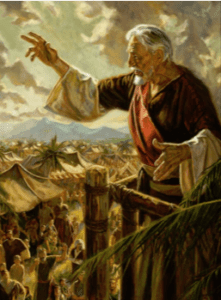
And now, these are the words which king Benjamin desired of them; and therefore he said unto them: Ye have spoken the words that I desired; and the covenant which ye have made is a righteous covenant. And now, because of the covenant which ye have made ye shall be called the children [Heb. bĕnê] of Christ, his sons [bānāw] and his daughters [ûbĕnôtāw] for behold, this day he hath spiritually begotten you; for ye say that your hearts are changed through faith on his name; therefore, ye are born of him and have become his sons [bānâw] and his daughters [ûbĕnôtāw]. (Mosiah 5:6-7)
King Benjamin quotes Psalm 2:7, the divine rebirth formula in one of the most Psalter’s important enthronement Psalms: ““I will declare the decree: the Lord hath said unto me, Thou art my Son [bĕnî]; this day have I begotten thee.” These words, which solemnized or formalized the sonship of the Davidic king to Yahweh, King Benjamin applies to his own people: they are Christ’s bānîm and bānôt, “his sons and his daughters.” King Benjamin follows the precedent of Moses’s declaration to Israel in Deuteronomy: “Ye are the children [bānîm] of [to] the Lord your God” (Deuteronomy 14:1 [MT]; cf. Hosea). Moreover, he utilizes the language of an oracle through the prophet Nathan to David regarding his future heir (Solomon) declared: “I will be his father [I will become to him for a father] and he shall be my son [bēn, literally, he shall become to me for a son” (2 Samuel 7:14). All of this plays on the first element in Benjamin’s name: bēn/bin, “son.”
King Benjamin follows the wordplay on bēn/bin almost immediately with a wordplay on the second element in his name, –yāmîn—“right hand”:
And it shall come to pass that whosoever doeth this shall be found at the right hand [yāmîn] of God, for he shall know the name by which he is called; for he shall be called by the name of Christ.
The expression “at the right hand” plays on the –yāmîn element, invoking Psalm 110, another royal enthronement psalm: “The Lord said unto my Lord, Sit thou at my right hand [lîmînî (lĕ + yĕmînî)], until I make thine enemies thy footstool” (Psalm 110:1). Again, King Benjamin applies words historically addressed to the Davidic king in a ritual context to his own people. If true and faithful to their covenant with Christ as his sons and daughters by “retaining” his name, King Benjamin’s people will become sons and daughters at God’s “right hand.” Otherwise, they will be found on the “left hand” of God (Mosiah 5:10, 12), a further play on his name. King Benjamin thus makes his own name—“son of the right hand”—a prophetic and christological symbol of what the faithful become: exalted sons and daughters at God’s right hand, like Jesus Christ himself.[32]
Judah and Jews: “Praised Out of a Feeling of Gratitude”
The Genesis text twice explains the personal and tribal name Judah in terms of the verbal root ydy/ydh. Moshe Garsiel writes, ““[Judah is] explained in terms of a derivation from the root y-d-h (ה״די), which in its causative stem means ‘to offer praise out of a feeling of gratitude.’”[33] The Genesis narrator reports that Leah named her son Judah on this basis: “And she conceived again, and bare a son: and she said, Now will I praise the Lord [ʾôdeh ʾet-yhwh]: therefore she called his name Judah [yĕhûdâ]” (Genesis 29:35). This etiological pun does not attempt to provide a strictly “scientific” etymology. Instead, these words imputed to Leah aim at the idea of yāhô + ʾôdeh, “The Lord will I praise/thank.” This etiology makes the name Judah a symbol of praising the Lord out of a feeling of thanks.
This etiology, of course, has implications for the eponymous descendants of Judah—i.e.., the tribe of Judah, many of whose descendants we recognize by the derived gentilic term “Jews.” Jacob’s “patriarchal” blessing upon Judah, as preserved in Genesis 49, recognizes this. Jacob declares, “Judah [yĕhûdâ], thou art he whom thy brethren shall praise [literally, thou — thy brethren shall thank thee, yôdûkā]; thy hand [yādĕkā] shall be in the neck of thine enemies; thy father’s children shall bow down before thee” (Genesis 49:8). This text appears to mark out a glorious prophetic destiny for descendants of Judah, who are those to be “praised out of a feeling of gratitude.”
As N.T. Wright recognizes that the apostle Paul appears to have used the “praise”/ “thanks” etymology as a pun on Judah[34] when the latter declares in his letter to the Romans: “But he is a Jew, which is one inwardly; and circumcision is that of the heart, in the spirit, and not in the letter; whose praise [epainos] is not of men, but of God. (Romans 2:29).” Commenting on this passage, Mark D. Nanos states: “Paul’s point is not that Gentiles are the true Jews, or that the foreskinned are the true or real circumcision; quite the opposite: the terms ‘Jew’ and ‘circumcision’ are reserved for Israelites.”[35] He suggests that Paul thought in Romans 2:29 is better rendered thus: “Rather, the deepest character of the Jew, even the purpose of circumcision, is about the spirit, the intentions of the heart (at work through the way one lives who is so marked), not (merely) inscribed (in flesh) (as if a mark alone fully defined who one is).”[36]
The potential for the misunderstanding and misapplication of Paul’s words is not hard to see, however, especially among Gentile converts to the first-century church and afterward. The misunderstanding of Paul’s words here and elsewhere gave rise to the false doctrine of supersessionism or replacement theology, the Gentile Christian notion that Christians had replaced Jews in God’s plan.
Nephi records that the Lord foresaw Latter-day gentile (especially Gentile Christian) antisemitism and that it displeased him:
But thus saith the Lord God: O fools, they shall have a Bible; and it shall proceed forth from the Jews, mine ancient covenant people. And what thank they the Jews [*yôdû ʾet-hayyĕhûdîm] for the Bible which they receive from them? Yea, what do the Gentiles mean? Do they remember the travails, and the labors, and the pains of the Jews, and their diligence unto me, in bringing forth salvation unto the Gentiles? (2 Nephi 29:4)
This oracle, the strongest condemnation of antisemitism in scripture,[37] plays on the name Judah in its derived gentilic form “the Jews”—Hebrew hayyĕhûdîm—terms of the verb ydy/ydh, “praise,” “thank.” Near the end of his writings Nephi warns against not “respect[ing] the words of the Jews and Mormon records the following warning to the Gentiles: “Yea, and ye need not any longer hiss, nor spurn, nor make game of the Jews, nor any of the remnant of the house of Israel” (3 Nephi 29:8). Not “respect[ing],” “hiss[ing] (at),” “spurn[ing],” and “mak[ing] game” of the Jews are all antonymic of “thanking” or “praising” the Jews or the “salvation” that has come from them, including the Savior himself (John 4:22; cf. 1 Nephi 15:14-15). The name Judah, in the Bible and the Book of Mormon, constitutes a symbol of “praise out of a feeling of gratitude” or thanks to God for blessings received from him (cf. D&C 59:21).
Conclusion
As I have attempted to show in the foregoing presentation, the restored text of JST Genesis (i.e., the Book of Moses) and the writers of the Book of Mormon not only evidence an awareness of the etymologies and etiologies of some of the most prominent names in Genesis, but they use them as autobiographical, biographical, narratological, and prophetic symbols. The number and quality of examples suggests that the Book of Mormon and the restored narratives in the Book of Moses as constituting authentic ancient texts and examples of translation literature rather than as mere products of human “religious genius.” These names meant a great deal more to ancient Israelites including those of Israel’s scatter branches, than is often supposed. And the names themselves imbued their texts with greater meaning.
In a future presentation, I hope to discuss the symbolic, narratological, and prophetic power of Semitic names in ancient scripture that are unattested or rarely attested in the biblical record. Until then, I thank you for your kind attention.
Endnotes
[1] In addition to the name and figure of Shem in Genesis … Cf. the “men of renown” or “men of the name” (ʾanšê haššēm) in Genesis 5 and the people of the tower in Genesis 11:4: “let us make us name [šēm].”
[2] Michael P. O’Connor, “The Human Characters’ Names in the Ugaritic Poems: Onomastic Eccentricity in Bronze-Age Wes Semitic and the Name Daniel in Particular,” in Biblical Hebrew in Its Northwest Semitic Setting: Typological and Historical Perspectives, ed. Steven E. Fassberg and Avi Hurvitz (Winona Lake, IN: Eisenbrauns, 2006), 270.
[3] Ibid. O’Connor further notes, “Such names are unusual in the modern European languages, although there are a few, e.g., in modern English, Charity, Hope, Rose, and so on.”
[4] See also Amos 3:2.
[5] Cf. Psalm 17:14; Deuteronomy 30:15; cf. also Ecclesiastes 6:12.
[6] KJV “quickening spirit” – to “quicken” means to “make alive.”
[7] Cf. D&C 138:39.
[8] Matthew L. Bowen, “Getting Cain and Gain” Interpreter: A Journal of Mormon Scripture 15 (2015): 115-141.
[9] Moses 5:24.
[10] Hugh Nibley, Approaching Zion (Salt Lake City: Deseret Book and FARMS, 1989), 436.
[11] Noel Reynolds, “The Brass Plates Version of Genesis,” in By Study and Also by Faith: Essays in Honor of Hugh W. Nibley on the Occasion of His Eightieth Birthday, 27 March 1990, ed. John M. Lundquist and Stephen D. Ricks, 2 vols. (Salt Lake City and Provo, UT: Deseret Book and FARMS, 1990), 2:136–173.
[12] Mosiah 28:17: “And this account shall be written hereafter; for behold, it is expedient that all people should know the things which are written in this account.”
[13] Genesis 3:16-17.
[14] Cf. Jeremiah 31:15; and Psalm 77:2 [MT 77:3].
[15] Terrence L. Szink, “The Vision of Enoch: Structure of a Masterpiece,” Journal of the Book of Mormon and Restoration Scripture 17/1–2 (2008): 14.
[16] See Matthew L. Bowen, “This Son Shall Comfort Us”: An Onomastic Tale of Two Noahs,” Interpreter: A Journal of Mormon Scripture 23 (2017)
[17] Isaiah 52:9; cf. 49:13; see especially Isaiah 54:9-11 quoted in 3 Nephi 22:9-11.
[18] For more on the significance of the name Ishmael in the Bible and the Book of Mormon, see Matthew L. Bowen, “‘If Ye Will Hearken’: Lehi’s Rhetorical Wordplay on Ishmael in 2 Nephi 1:28–29 and Its Implications,” Interpreter: A Journal of Mormon Scripture 25 (2017): 157-189.
[19] Martin Noth, Die israelitischen Personennamen im Rahmen der Gemeinsemitischen Namengebung
(BWANT 3/10; Stuttgart: W. Kolhammer, 1928), 173. See also HALOT, 2:872.
[20] Matthew L. Bowen, “Jacob’s Protector” (forthcoming).
[21] John A. Tvedtnes and Matthew Roper, “Jacob and Enos: Wrestling before God,” Insights 21/5 (2001): 2-3.
[22] Matthew L. Bowen, “‘And There Wrestled a Man with Him’ (Genesis 32:24): Enos’s Adaptations of the Onomastic Wordplay of Genesis,” Interpreter: A Journal of Mormon Scripture 10 (2014): 151-160.
[23] Moshe Garsiel, Biblical Names: A Literary Study of Midrashic Derivations and Puns, trans. Phyllis Hackett (Ramat Gan: Bar-Ilan University Press, 1991), 173.
[24] Matthew L. Bowen, “‘Their Anger Did Increase Against Us’: Nephi’s Autobiographical Permutation of a Biblical Wordplay on the Name Joseph,” Interpreter: A Journal of Mormon Scripture 23 (2017): 115-136.
[25] Matthew L. Bowen, “Wordplay on the Name Joseph and an Early Instance of Gezera Shawa in the Book of Mormon,” Insights 30/2 (2010): 2-4; idem, “Onomastic Wordplay on Joseph and Benjamin and Gezera Shawa in the Book of Mormon,” Interpreter: A Journal of Mormon Scripture 18 (2016): 255–273.
[26] See Nephi’s use of a term rendered “more” in 2 Nephi 28:27-30; 29:3-14.
[27] I have written on this subject at length in Matthew L. Bowen, “Becoming Sons and Daughters at God’s Right Hand: King Benjamin’s Rhetorical Wordplay on His Own Name,” Journal of the Book of Mormon and Other Restoration Scripture 21/2 (2012): 2-13; idem, “Onomastic Wordplay on Joseph and Benjamin,” 255-273.
[28] See, e.g., Baruch Halpern, The First Historians: The Hebrew Bible and History (University Park: Pennsylvania State University Press, 1996), 390-41. Halpern notes in addition (p. 41) “In no other text [beyond Judges 3:15–21; 20:16; and 1 Chronicles 12:2] does handedness figure.”
[29] So Julia E. Smith Parker, trans. Holy Bible: Containing the Old and New Testaments; Translated Literally from the Original Tongues (Hartford, CT: American Pub., 1876), 307.
[30] Graeme Auld, I & II Samuel: A Commentary (Louisville, KY: Westminster/John Knox, 2011), 266.
[31] Bowen, “Becoming Sons and Daughters at God’s Right Hand,” 2-13.
[32] See, e.g., see Acts 2:33; Moroni 7:27; D&C 20:24; 76:19–24; and JST Luke 3:7.
[33] Moshe Garsiel, Biblical Names: A Literary Study of Midrashic Derivations and Puns (trans. Phyllis Hackett; Ramat Gan: Bar-Ilan University Press, 1991), 171.
[34] N.T. Wright, Paul in Fresh Perspective (Minneapolis: Fortress Press, 2005), 118.
[35] Mark D. Nanos, “The Letter of Paul to the Romans,” in The Jewish Annotated New Testament: New Revised Standard Version Bible Translation, ed. Amy-Jill Levine and Marc Zvi Brettler (New York: Oxford University Press, 2011), 259.
[36] Ibid.
[37] See Matthew L. Bowen, “‘What Thank They the Jews’? (2 Nephi 29:4): A Note on the Name ‘Judah’ and Antisemitism,” Interpreter: A Journal of Mormon Scripture 12 (2014): 111–125.
